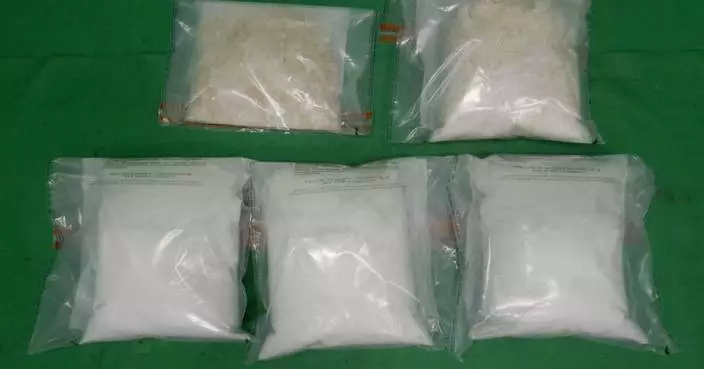Investigation and Study Group presents recommendations to HKU Council on personnel arrangements for HKU senior positions
The following is issued on behalf of the Investigation and Study Group on the Internal OperationalAffairs of the University of Hong Kong:
At a meeting of the Council of the University of Hong Kong (HKU) held today (September 3), the Investigation and Study Group (ISG) on the Internal OperationalAffairs of the University of Hong Kong presented its findings and recommendations on the personnel arrangements for senior positions of the HKU. The ISG is pleased to note that the HKU Council has fully accepted the recommendations. This outcome is the result of more than two months of relentless efforts by the ISG, which can help the HKU resume normal operations as soon as possible in its fundamental interest.
The recommendations were formulated after the ISG held more than 60 meetings with relevant parties, including the Chairman and members of the HKU Council, and the President and Vice-Chancellor, and senior management staff of the HKU, and examined relevant documents. They sought to provide practical solutions to ensure clarity and certainty regarding the personnel arrangements for senior positions of the HKU.
The guiding principles for the ISG were:
(a) taking the interest of the HKU as the overriding priority;
(b) making early resolution of differences as much as possible to facilitate the smooth and effective operations of the HKU;
(c) making continuous efforts in facilitating communication and co-ordination among parties concerned to strive for the overall interest of the HKU; and
(d) sharing good practices and experiences in the process to ensure that the HKU operates in accordance with the requirements of the University Accountability Agreement and uses funds properly.
The ISG also took into account various factors, including the practicality of the Council Resolutions as well as the willingness of officers concerned in taking up the appointments.
The ISG also notes that the HKU has been conducting various search exercises, some of which are related to senior positions such as the Provost, Vice-Presidents, the Registrar and Deans. The ISG urges the Council and the management to work expeditiously on these searches with a view to filling such vacancies.
The findings and recommendations are the ISG's first deliverable, and the ISG will continue to pursue its work goals.
The Government announced the establishment of the ISG on June 11. The goals of the ISG are: (1) to clarify facts and understand issues of all parties; (2) to facilitate internal co-ordination, assist various parties to work together and strengthen mutual co-operation; and (3) to provide advice based on the investigations and studies, and propose recommendations regarding the improvement measures and good practices to ensure that the HKU operates in accordance with the requirements of the University Accountability Agreement and uses public funds properly.
The ISG is composed of the Permanent Secretary for Education, Ms Michelle Li, and the Chairman of the University Grants Committee (UGC), Mr Tim Lui, supported by a team formed by the Education Bureau and the UGC Secretariat.

Source: AI-generated images
CHP reminds public on precautions against cold weather
The Centre for Health Protection (CHP) of the Department of Health (DH) today (December 22) reminded the public, particularly the elderly and people with chronic illnesses, to adopt appropriate measures to protect their health in view of the cold weather.
A spokesman for the CHP said that cold weather can easily trigger or exacerbate diseases, especially among the elderly and persons suffering from heart disease, respiratory illnesses or other chronic illnesses.
"Elderly people have less insulating fat beneath their skin to keep them warm, and their body temperature control mechanisms may be weaker. Their body may not be able to appropriately respond to thecold weather," the spokesman said.
Some senior persons may have decreased mobility, which can impair their ability to generate and conserve body heat. Chronic illnesses, such as hypertension, diabetes and endocrine disorders, may undermine the health of elderly people and lower their metabolic rate, subsequently causing their body to generate less heat. Persons with chronic illnesses, such as chronic respiratory illnesses or heart disease, are vulnerable to disease aggravation due to cold weather.
The CHP reminded the public, in particular the elderly and persons with chronic illnesses, to adopt the following preventive measures:
Take note of the weather forecast. Wear warm clothing, including hats, scarves, gloves and socks, accordingly;
Consume sufficient food to ensure adequate calorie intake;
Perform regular exercise to facilitate blood circulation and heat production;
Stay in a warm environment and avoid prolonged outdoor exposure;
Use heaters with care and maintain adequate indoor ventilation; and
Seek medical advice if feeling unwell.
In addition, the public should avoid alcoholic beverages.
"Drinking alcohol cannot keep you warm. Alcohol accelerates the loss of body heat through dilated blood vessels, resulting in chilling instead," the spokesman said.
"Parents should ensure that babies are sufficiently warm, but it is also important to keep babies relatively lightly clothed to avoid overheating them," the spokesman added.
Parents should observe the following safety measures when putting their children to bed:
Keep the room well ventilated and at a comfortable temperature;
Always place babies on their backs to sleep. Leave their heads, faces and arms uncovered during sleep;
Babies do not need pillows. Place babies on a firm and well-fitted mattress to sleep. Avoid soft objects, pillows and loose bedding;
Let babies sleep in a cot placed near their parents' bed; and
Maintain a smoke-free environment.
In addition, many respiratory pathogens, including influenza and SARS-CoV-2, may have increasing activity and community transmission during winter. Seasonal influenza vaccination is recommended for all persons aged 6 months or above, except those with known contraindications. Persons at higher risk of getting influenza and its complications, including the elderly and children, should receive seasonal influenza vaccinations early. Please see details of the vaccination schemes on theCHP's website.
A person who gets influenza and COVID-19 at the same time may be more seriously ill and would have a higher risk of death. It is important for elderly persons, especially those residing in residential care homes, to receive both a seasonal influenza vaccination and a COVID-19 vaccination. They should also receive an additional booster against COVID-19 according to recommendations as soon as possible. The public should also maintain good personal and environmental hygiene against respiratory illnesses and note the following:
Surgical masks can prevent transmission of respiratory viruses from ill persons. It is essential for persons who are symptomatic (even if having mild symptoms) to wear a surgical mask;
Wear a surgical mask when taking public transport or staying in crowded places. It is important to wear a mask properly, including performing hand hygiene before wearing and after removing a mask;
Avoid touching one's eyes, mouth and nose;
Wash hands with liquid soap and water properly whenever possibly contaminated;
When hands are not visibly soiled, clean them with 70 to 80 per cent alcohol-based handrub;
Cover the mouth and nose with tissue paper when sneezing or coughing. Dispose of soiled tissue paper properly into a lidded rubbish bin and wash hands thoroughly afterwards;
Maintain good indoor ventilation;
When having respiratory symptoms, wear a surgical mask, refrain from work or attending classes at school, avoid going to crowded places and seek medical advice promptly; and
Maintain a balanced diet, exercise regularly, take adequate rest, do not smoke and avoid overstress.
Food-borne diseases, particularly those linked to hotpot cuisine, are also common in cold weather. The following preventive measures should be taken:
Wash hands before handling and consuming food;
Do not patronise unlicensed vendors or those with poor hygienic standards while selecting food;
Wash and cook all food thoroughly;
Vegetables should be washed thoroughly in clean running water before cooking and consumption. When appropriate, scrub vegetables with hard surfaces with a clean brush to remove dirt and substances, including pesticide residues and contaminants, from surfaces and crevices;
Shrimps should be fully cooked until the shells turn red and the flesh turns white and opaque;
For shellfish such as scallops and geoduck, scrub the shells thoroughly and remove internal organs;
Do not eat any undercooked freshwater aquatic products. To ensure that the food is thoroughly cooked, the centre of the food should reach a temperature of at least 75 degrees Celsius so as to destroy pathogen;
Most hotpot ingredients should be stored in a refrigerator at 4 degrees C or below, while frozen food should be stored in a freezer at -18 degrees C or below;
Never use raw eggs as a dipping sauce for hotpot; and
Use different sets of chopsticks to handle raw and cooked food to avoid cross-contamination.
In addition, when using fuel-burning appliances, especially in indoor areas, the public should ensure adequate ventilation to avoid harmful exposure to carbon monoxide (CO) and prevent CO poisoning.
For more health information, the public may call the DH's Health Education Infoline (2833 0111) or visit theCHP's websiteandFacebook Fanpage.
The public may also call Dial-a-Weather (1878 200) or visit thewebsite of the Hong Kong Observatoryfor the latest weather information and forecasts, or itspage on Weather Information for Senior Citizens.








